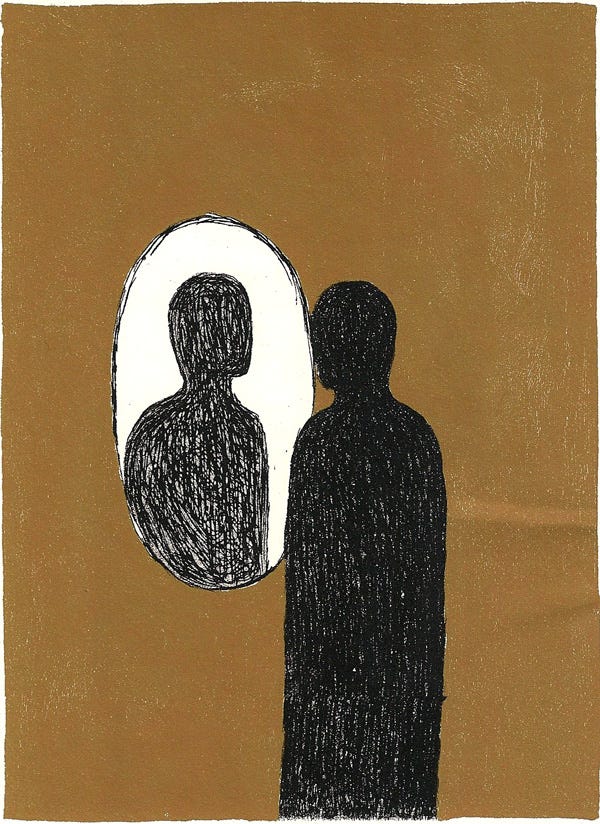This post might not be for you. If you’re not like me, it probably won’t resonate.
You’ve been warned. 🙂
But if you are at least sort of like me—someone with a historical tendency for worrying, judging others, and generally neurotic without looking the part—you might find it useful.
Success?
I started programming around 1999, landed my first part-time developer job in 2003, did a bunch of that for over a decade and eventually moved to Berlin on January 1st 2015. Over the last (almost) 9 years, I went from being a mid-level developer to engineering manager and later engineering executive. I built engineering teams and engineering organizations. I hired hundreds of people. And now I work full-time as a leadership coach to some great tech leaders all over the world.
When you look at my career from the outside, you’ll probably say it’s reasonably successful.
What you could only see from the inside is how difficult this past decade has been for me. Just like many startups have a huge Cost of Revenue, so did I have a huge “Cost of Success.”
Back in the hyperscaling company I joined in 2015, I had both a huge drive to do and improve stuff and this pesky tendency to take things personally. I did not know at the time, but the immense energy and drive I had then was “dirty.” It came from this place of not enoughness that so many of us carry but few talk about.
What I could only realize in hindsight, and with the precious help of others, is that my identity was completely wrapped up in my work.
When you allow that to happen, it’s no wonder you take things personally. Anything important that doesn’t go your way is felt as an attack on you. You either feel it as inflicted by someone else or simply as a “I’m not good enough, I will soon be found out, what’s wrong with me?” type thing.
Or both.
Some people get depressed, but I’m more of the anxious type. Two sides of the same coin. But in my case, anger would be the result. Anger at others, and anger at myself.
Anger and pain are powerful sources of energy but they burn very dirty. And, as such, they are not sustainable. Sooner or later, there’s hell to pay.
Which is why I can say 3 things about the 3 major roles I had in the last few years before coaching:
The results were generally very positive everywhere I went, and I’m proud of what we accomplished.
I learned an enormous amount (which now enables me to be a coach), and worked with incredible people.
I burnt out at the end of every single one of these jobs.
Come to think of it, I had minor burnouts before moving abroad, too.
Even the way I approach online writing is in spurts of obsessive productivity followed by an almost complete disengagement. This very newsletter is a historical record of that dynamic. It’s been a perpetual cycle in everything I do, with one common denominator:
Me.
Because wherever you go, there you are.
And I can assure you that the world will keep on spinning, no one will change, and that it’s up to you to figure out the cheat code to life: that only when you change will all the rest magically change with it. I have glimpses of that, and it’s amazing.
Having turned 40 and after being in a very dark place last year, I ultimately realized that the reason why my identity was so (con)fused with my work is because I didn’t have one to begin with.
So, work gobbled up all that empty space.

Identity?
Dr. Gabor Maté talks about “small-T” trauma, the type inflicted on you not by having bad things happen to you, but by what should have happened to you but didn’t—your needs as a child for acceptance, attachment, closeness, recognition, safety not being met.
Unfortunately, as a small child we have no way of reasoning about the predicament we find ourselves in. And the default is inevitably to feel it as if we’re not worthy of love—an enormous threat to our survival.
From that point on, our brains keep looking for ways to prove us right (despite being very, very wrong) and the feeling of not enoughness becomes an invisible core feature of our being. Yet it colors every event, every interaction, every outcome (“See? I told you”, the mind sneers.)
I’m not at all surprised that imposter syndrome is so prevalent at work today.
The other consequence is that while we’re trying to cope with all of this, we are not able to build our sense of self-confidence in how we deal with the world. Our identity is anemic, sometimes horribly so. I remember oftentimes during my adolescence feeling like I didn’t really know who I was, but I sure felt that many around me knew what they were doing.
Like they had an identity, and I didn’t.
When we don’t have a sense of who we are, we’re fragile. We put up a front, some of us even becoming narcissists out of an impossibly deep feeling of insecurity. Any “attack” on something we did translates seamlessly as an attack on who we are.
Which is… what? Hard to tell, right?
Freedom?
Awareness is the necessary first step for any meaningful change. If some of the above resonated, you are probably no longer on auto-pilot about this stuff like I was for many, many years.
The good news is that you can actively shape (or even re-create) your identity, no matter the starting point.
First, acknowledge to yourself that whatever happened (or didn’t) when you were too young to do something about it is not your fault. Every human being is worthy of love and acceptance just by virtue of existing on this planet. There’s no deficit to recover.
Read that again.
Second, your parents were doing the best they could with the level of awareness they had. Easy to understand cognitively, hard to internalize emotionally.
And third, you’re not condemned to live your biographical past into your as-of-yet undetermined future.

Absolutely let go of any shred of belief that you can predict the future. You cannot.
Instead, focus on sensing and responding.
When it comes to reshaping our identity, we have a brilliant built-in mechanism to sense what to work on, beautifully articulated in the following Peter Crone aphorism:

Anytime you get angry, sad, frustrated—rattled in any way—that’s your system giving you a clue about what you need to change about yourself in order to be truly free. Listen to it. Unfortunately, I spent most of my life oblivious to its existence, but it’s never too late to start listening.
And finally, James Clear, the author of Atomic Habits, talks about building identity-based habits:

To change your behavior for good, you need to start believing new things about yourself. You need to build identity-based habits.
Exactly what we’re talking about.
The beauty of this is that we first choose who we want to be—a nearly infinite canvas to paint on. And then we act accordingly, until it becomes second nature. As Clear puts it:
Changing your beliefs isn’t nearly as hard as you might think. There are two steps.
1. Decide the type of person you want to be.
2. Prove it to yourself with small wins.
File it away under “simple, not easy.”
One final piece of advice on identity: keep it small.
It’s one of those many paradoxes (or I should say polarities) of life. You want to have an identity so you’re not flailing in the wind… but also not too much of it. The larger and more entrenched our identity is, the more inflexible we become, and the more brittle we are.
Too little and too much identity both make us fragile. We must find the middle way.
In Closing
I warned you. This is not an engineering leadership post. But if you’ve ever led other people, you probably notice it actually really is.
My realization is that without self-awareness we risk burning enormous amounts of energy—and inevitably find ourselves running empty from time to time. It’s not just tiredness, it’s much deeper than that. But we can do something about it. And when we lead others, it’s our responsibility to do so.
If this post did not resonate with you personally, and you still read it through—thank you. A side quest here was to generate more empathy and compassion from those who do not deal with issues of identity towards those who do.
Because, contrary to popular belief, we can only build great businesses that are great places to exist in if we get along with each other. And that requires really understanding ourselves so that we have the space inside us to understand others.
That’s, in essence, the inner work of the leader.
Thank you Mayankk for the conversation about identity over coffee many moons ago. This post is an oblique result from it. Gratitude. 🙏





So true about anger and pain burning dirty! Thank you for your story about dark energy to self-awareness!
It feels like this is never ending. Identities change, reshape, evolve.
I feel like my identity changed a lot when my son was born. Life changes: how we see world, who we are, how we see outselfs. I would say it is good practice to constantly work on knowing yourself as this is never constant.
Probably many people suffer from not knowing who they are, where they belong. And many people suffer from not working on finding out.